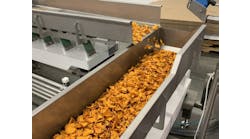The Shaka process (www.shakaprocess.com) sterilizes cans, jars, plastic containers, pouches or bowl-type packages much like a typical retort. But it claims up to a 90 percent reduction in process cycle time, occupies 60-70 percent less space and saves energy over a conventional batch retort system.
Developed by U.K.-based Zinetec Ltd., the system vigorously shakes the product to mix it for rapid heat transfer through the containers and through the basket holding the individual product. The shaking results in less required heat, which in turn results in organoleptic improvements -- better retention of taste, color and mouthfeel -- with less need for chemistry to compensate for quality losses.
The typical product -- such as a 16- or-18-oz. can or pouch with particulates up to a half-inch cube -- will take 5-10 mins. instead of the typical hour or more it takes a conventional retort to ramp-up the heat, sterilize the product and then cool it down. Applications have proliferated in from simple soups, sauces and baby food to a broader range of products as a result of research on processing dynamics -- namely, how to eliminate cold spots in the package.
Retort manufacturers in Germany, France and the U.S. offer systems at the pilot and “semi-industrial” scale. Full production-scale units are hitting the market now in Europe, to be followed by U.S. representation by Allpax Products (www.allpax.com), Covington, La. UK engineering firm Zinetec also has licensed the process directly to food processors, including global brands that “now have pilot plants and are developing product,” says John Emanuel, chairman of Utek Europe and a licensing advisor to Zinetec.
A newfound benefit -- or one research now backs-up -- is energy savings. “With the emphasis on running plants a bit 'greener,' saving energy becomes much more important,” says Emanuel. He says the Shaka process can save 40-60 percent of the energy used in a typical saturated-steam, static or even a more efficient rotary retort.
Emanuel says there are no regulatory hurdles because the U.S. FDA views the technology as a conventional retort process subject to conventional sterilization recording and reporting. Additionally, he says the company is working with "a couple dozen" thermal processing specialist-members of the Institute for Thermal Processing Specialists to release public-domain protocols for prospective plants to ease consideration and adoption.
The process is positioned to compete with processing alternatives including aseptic, and it can help processors bring to market premium, ambient products to compete with refrigerated and frozen alternatives.

